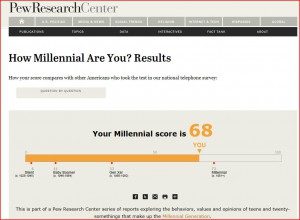
For this week, the Data Dude looked at the recent Pew Research survey entitled
Younger Americans and Public Libraries. Pew broke this down into three different age groups: (1) High schoolers (ages 16-17); (2) College-aged (18-24 – although many do not attend college), and (3) 25-29. The term “Millennial” (for purposes of this study) encompasses all three of these groups. The Dude salutes this group of Millennials, not only for their tech-savviness, innovative thinking, generalized support of libraries, and
distrust of “the man”, but because they seem to be getting a lot of other important things right. According to Intelligence Group studies (as reported by
Forbes – yes, that’s right, the Dude is citing Forbes) of Millennials:
- 64% of them say it’s a priority to make the world a better place;
- 88% prefer a collaborative work culture rather than a competitive one; and
- 88% want “work-life integration”
OK, the Dude admits that he isn’t exactly certain what is meant by “work-life integration”. It sounds like they might be saying that quality of life is more important than the Camusian like day to day drudgery that many people experience these days. Let’s go with that. The Dude votes thumbs up on this and on making the world a better, more cooperative place. Not that the Dude is lazy or unambitious, because he isn’t. We will label this as the importance of workplace “flexibility” and the ability of society to recognize the value of it. Meaningful thought and creativity can often come outside the hours of 8-5, at the gym, in the can, or on the road. And let’s face it; the world seems to be getting more and more devoid of creativity, empathy, and connectedness. Anyway, enough of this social nonsense, on to the libraries. Here’s the highlights from the Pew Research survey regarding Millennials (those under 30) and libraries:
- 77% have a smartphone
- 62% agree that there is “a lot of useful, important information that is not available” online (my emphasis) – a higher percentage than older adults
- Slightly more than half (57%) said it was easy to separate good information from bad information online (meaning that almost half found it difficult)
- 88% reported reading a book in the past year (compared to 79% of those over 30)
- 43% report reading a book (in any format) on a daily basis (similar to the percentage of older adults)
- 67% (compared to 58% of those over 30) reported reading a book (in any format) at least weekly
- 98% use the internet, and 90% say they use social networking sites
- Of those who reported reading a book in the past year, 47% reported that it was an eBook (compared to 42% of those ages 30-49)
- 61% have a library card
- 57% reported using a library in the past year (compared to 53% of those over 30)
- 36% (compared to 28% of those over 30) reported using a library website in the past year
- Only 19% (compared to 25% of those over 30) reported knowing “all or most” of the services that their library offered
It is encouraging that these results indicate that Millennials recognize the importance of information literacy and are themselves readers. One would tend to think that this translates into their recognition of the value of librarians (or information professionals) and libraries in helping develop this set of important literacy skills. However, merely reading books doesn’t necessarily translate into being a library supporter or a library user. The Dude thinks that the key is in the marketing and packaging of libraries. As this study illustrates (as do many others), the primary challenge is not in potential library users recognizing the value of library services, it’s knowing that those services are even there in the first place. Shaka.
 For this week, the Data Dude looked at the recent Pew Research survey entitled Younger Americans and Public Libraries. Pew broke this down into three different age groups: (1) High schoolers (ages 16-17); (2) College-aged (18-24 – although many do not attend college), and (3) 25-29. The term “Millennial” (for purposes of this study) encompasses all three of these groups. The Dude salutes this group of Millennials, not only for their tech-savviness, innovative thinking, generalized support of libraries, and distrust of “the man”, but because they seem to be getting a lot of other important things right. According to Intelligence Group studies (as reported by Forbes – yes, that’s right, the Dude is citing Forbes) of Millennials:
For this week, the Data Dude looked at the recent Pew Research survey entitled Younger Americans and Public Libraries. Pew broke this down into three different age groups: (1) High schoolers (ages 16-17); (2) College-aged (18-24 – although many do not attend college), and (3) 25-29. The term “Millennial” (for purposes of this study) encompasses all three of these groups. The Dude salutes this group of Millennials, not only for their tech-savviness, innovative thinking, generalized support of libraries, and distrust of “the man”, but because they seem to be getting a lot of other important things right. According to Intelligence Group studies (as reported by Forbes – yes, that’s right, the Dude is citing Forbes) of Millennials:

